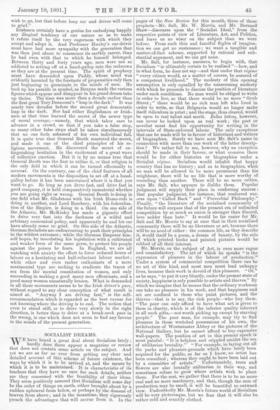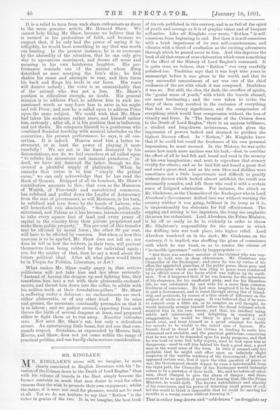SOCIALIST DREAMS.
WE have heard a great deal about Socialism lately ; hardly does there appear a magazine or review that does not contain some article on the subject. And yet we are as far as ever from getting any clear and detailed account of this scheme of future existence, the ways by which it is to be arrived at, and the means by which it is to be maintained. It is characteristic of its teachers that they have no care for such details, neither are they concerned with the feasibility of their ideas. They seem positively assured that Socialism will some day be the order of things on earth, either brought about by a sudden upheaval from below, or perhaps by the descent of heaven from above • and in the meantime, they vigorously preach the advantages that will accrue from it. In the pages of the New Review for this month, three of these prophets—Mr. Salt, Mr, W. Morris, and Mr. Bernard Shaw—discourse upon the " Socialist Ideal," from the respective points of view of Literature, Art, and Politics, and leave us no wiser on the subject than we were before. From such thin and fanciful flights of imagina- tion we can get no sustenance ; we want a tangible and matter-of-fact scheme, supported by rational and sub- stantial argument, and we can get none. Mr. Salt, for instance, assumes, to begin with, that Socialism " is ultimately certain to be realised "—how, and in what form, he does not say—and that under that regime " every citizen would, as a matter of course, be assured of a competent livelihood." The modesty of this opening assumption is only equalled by the unassuming modesty with which he proceeds to discuss the position of literature under such conditions. No man would be obliged to write in order to live, so that there would be no more " Grub Street ; " there would be no rich man left who lived in order to write, so that Belgravia would no longer make itself ridiculous in print ; and the stage, thus cleared, would be open to real talent and merit. Belles lettres, however, can never be looked upon as real work ; the poet or novelist must find his opportunity for writing in the intervals of State-enforced labour. The only exceptions that can be made will be in favour of historians and writers of biographies. Surely we have seen Mr. Salt's name in connection with more than one work of the latter descrip- tion P We rather fail to see, however, why an exception should be made in their favour, or what occasion there would be for either histories or biographies under a, Socialist regime. Socialism would inhabit that happy country that has no history ; and as to biographies, when no man will be allowed to be more prominent than his neighbour, there will be no life that is more worthy of recording than another. There will be no more critics, says Mr. Salt, who appears to dislike them. Popular judgment will supply their place in conferring success that popular judgment, for instance, that conferred suc- cess upon " Called Back " and " Proverbial Philosophy." Finally, " the literature of the socialised community of the future will surpass that of the present era of unlimited competition by so much as union is stronger than discord, love nobler than hate," It would be far easier for Mr. Salt and Mr. Morris to say at once that in their socialised community there will be no literature or art, because there will be no need of either : the common life, as they describe it, would itself be a poem, a dream of beauty, by the side of which printed books and painted pictures would be robbed of all their interest.
Mr. Morris, on the subject of Art, is even more vague and unsatisfactory. The art of which he speaks " is the expression of pleasure in the labour of production." Under a system of commercial competition there can be no art of this kind, and most men must lead unhappy lives, because their work is devoid of this pleasure. " Or," as he says, " to put it very bluntly, under the present state of society, happiness is only possible to artists and thieves." By which we imagine that he means that the ordinary workman can take no pleasure in his work, and that happiness and art are confined to those who paint pictures, and the thieves—that is to say, the rich people—who buy them. " The poor can only afford to have what art is given to them in charity, which is of the inferior quality inherent in all such gifts,—net worth picking up except by starving people." The poor man, for example, may try to find pleasure in those wretched possessions of his own, the architecture of Westminster Abbey or the pictures of the National Gallery, but he cannot afford to buy expensive wall-papers. The position of art in this present epoch is most painful " It is helpless and crippled amidst the sem of utilitarian brutality." " For example, in laying out all the parks and pleasure-grounds which have lately been acquired for the public, as far as I know, no artist has been consulted ; whereas they ought to have been laid out by a committee of artists." Unfortunately, trees and flowers are also brutally utilitarian in their way, and sometimes refuse to grow where artists wish to plant them. For the rest, we gather that there is to be no more coal and no more machinery, and that, though the sum of production may be small, it will be beautiful to outward view. Undoubtedly Mr. Morris's future world of Socialism will be very picturesque, but we fear that it will also be rather cold and scantily clothed. It is a relief to turn from such sham enthusiasts as these to the more genuine article, Mr. Bernard Shaw. We cannot help liking Mr. Shaw, because we believe that he is earnest in his professions of faith, and because we suspect that, if he only had the power of saying it in- telhgibly, he would have something to say that was worth our hearing. In the present instance, he is so overcome by the absurdity of the situation, that he can only give way to uproarious merriment, and drown all sense and meaning in his own boisterous laughter. His per- formance reminds one of the animal whom .sop described as once usurping the lion's skin ; he first shakes his mane and attempts to roar, and then turns his back and flings his heels in our faces. His roars will deceive nobody ; the voice is so unmistakably that of the animal who was not a lion. Mr. Shaw's position is ridiculous enough, no doubt. His general mission is to address Paul, to address him in such im- passioned words as may force him to arise in his might and rob Peter ; and now he is called upon to address Peter upon the same subject. We could wish that Mr. Shaw had taken his audience rather more, and himself rather less, seriously ; after all, it is his position that is ludicrous, and not theirs. He compares himself to a gentleman who combined Socialist teaching with musical interludes on the concertina ; his present performance, he says, is all con- certina. It is indeed. Heaven send him a better in- strument, or at least the power of playing it more tunefully ! We are not in the least dismayed by his denunciations, nor do we feel ourselves at all called upon " to rebuke his monstrous and immoral paradoxes ;" in- deed, we have not detected the latter, though we dis- covered a plentiful supply of platitudes. When he remarks that virtue is to him " simply the primal curse," we can only acknowledge that he has read the Book of Genesis. Stripped of all its bombast, Mr. Shaw's contribution amounts to this : that even as the Mammon of Wealth, of Free-trade and unrestricted commerce, has subdued and pulled down the Lucifer of Aristocracy from the seat of government, so will. Mammon, in his turn, be subdued and torn down by the hands of Labour, who will henceforth rule absolutely. " Socialism, polite, con- stitutional, and Fabian as it has become, intends eventually to take every square foot of land and every penny of capital in the country from their private proprietors and make them public property." Ten per cent. of this transfer may be effected by moral force ; the other 90 per cent. will have to be effected by coercion. But when or how this coercion is to be applied, Mr. Shaw does not tell us ; nor does he tell us how the robbers, in their turn, will prevent themselves from being robbed by the individual again ; nor, for the matter of that, does he say a word about the future political ideal. After all, what place would there be in Utopia for Politics, Literature, or Art ?
What makes Mr. Shaw really angry is, that serious politicians will not take him and his ideas seriously. "Instead of having the dragon up and fighting him, they transform him into a rat with their plutocratic enchant- ments, and thrust him down into the cellar, to nibble with his million teeth at their foundation-pillars." Mr. Shaw is suffering under a delusion : no enchantments are used, either plutocratic, or of any other kind. By its cries and groans, the mountain continually persuades us that it is in labour ; and we gather around, expecting from such throes the birth of several dragons at least, and prepared either to fight them or to run away. Nascitur ridiculus mus. Not even Mr. Shaw's rat, but only a ridiculous mouse. An entertaining little beast, but not one that com- mands respect. Socialism, as expounded by Messrs. Salt, Morris, and Shaw, does not yet come within the range of practical politics, and can hardly claim serious consideration.

































 Previous page
Previous page